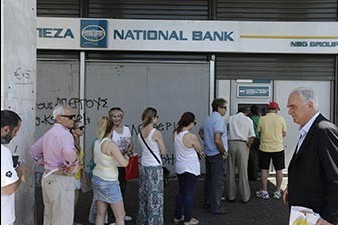
06/07/2015 18:10
Greece looks to reopen bailout talks as euro future in doubt
Greece and its membership in Europe's joint currency faced an uncertain future Monday, with the country under pressure to reach a bailout deal with creditors as soon as possible after Greeks resoundingly rejected the notion of more austerity in exchange for aid. AP reports.
With Greek banks running out of cash and facing the danger of collapse within days without new aid, the government in Athens is racing against the clock.
In an effort to facilitate negotiations on a new aid program, Finance Minister Yanis Varoufakis, who had clashed with European officials in the bailout talks, announced his resignation Monday.
But Greece and its creditors, who will meet again Tuesday to discuss how to keep the country in the euro, remain far apart on key issues, particularly the notion of debt relief.
The negotiations are complicated for the European creditors by Prime Minister Alexis Tsipras' triumph in Sunday's referendum. More than 61 percent of Greeks backed his call to vote "no" to budget cuts the creditors had proposed in return for rescue loans the country needs — even though those proposals were no longer on the table.
The vote was painted by opposition parties and many European officials as one on whether Greece should remain in Europe's joint currency. In the aftermath, many officials softened their tone and said talks would resume, though Greece's chance of staying in the euro was looking increasingly shaky.
The country's banks remain shut for a sixth working day the government tries to limit a drain of deposits despite limits on cash withdrawals at ATMs.
All eyes now turn to whether the European Central Bank will increase the amount of credit the banks can draw on to make up for the cash drain. Analysts expect the ECB to not provide more emergency assistance on Monday, meaning Greece might have to tighten its limits on cash withdrawals and transfers from the current 60 euros ($67) per day.
If the ECB does not increase its help to the banks, it will be impossible for Tsipras to keep his pledge to quickly restore Greece's banking system.
The Greek government has vowed to quickly restart negotiations with creditors in other eurozone countries and with the institutions that oversaw the country's bailout: the ECB, European Commission and International Monetary Fund.
Varoufakis appared to be the first casualty of the vote's fallout.
With his brash style and fondness for frequent media appearances, Varoufakis had visibly annoyed many of the eurozone's finance ministers during Greece's debt negotiations.
Varoufakis said in a statement he was told shortly after the referendum result that some other eurozone finance ministers and the country's other creditors would appreciate his not attending the ministers' meetings.
The idea was one "that the Prime Minister judged to be potentially helpful to him in reaching an agreement. For this reason I am leaving the Ministry of Finance today," he said.
As for his European negotiating colleagues, he said of them: "I shall wear the creditors' loathing with pride."
A replacement was to be announced later Monday.
With his high-stakes gamble to call a referendum with just a week's notice, Tsipras aimed to show creditors that Greeks, whose economy has been shattered and who face spiraling unemployment and poverty, have had enough and that the austerity prescribed isn't working.
But everything hinges on European reaction. A eurozone summit was hastily called for Tuesday afternoon to discuss the situation.
European officials appear to be split on a key demand by Greece to have the burden of its bailout loans be made more manageable.
France's finance minister, Michel Sapin, indicated that discussing Greece's debt is not taboo, saying the country could not recover with its current obligations "in the months and years to come."
Sapin also called for the ECB to maintain liquidity assistance to Greek banks.
Germany, however, remains reluctant to discuss debt forgiveness.
Finance Ministry spokesman Martin Jaeger said Germany's "position is well-known ... a debt cut is not an issue for us."
More broadly, Chancellor Angela Merkel's spokesman said talks on a new bailout program for Greece would depend on what proposals Athens makes.
Steffen Seibert said Germany respects the "clear 'no' vote" by Greeks against austerity measures."
However, he added that "in view of Greek citizens' decision yesterday, the conditions are not there at present to enter negotiations on a new program." He said the "no" vote is a vote against the principle — still supported by Germany — that solidarity requires countries to make their own reform efforts.
Besieged by a prolonged recession, high unemployment and banks dangerously low on capital, Greece defaulted on an IMF loan repayment last week, becoming the first developed nation to do so.
Now some analysts wonder if Greece is so starved of cash that it could be forced to start issuing its own currency and become the first country to leave the 19-member eurozone, established in 1999.
Tsipras was elected in January on promises to repeal the austerity demanded in return for its bailout and negotiations broke down late last month after dragging on unsuccessfully for five months.








